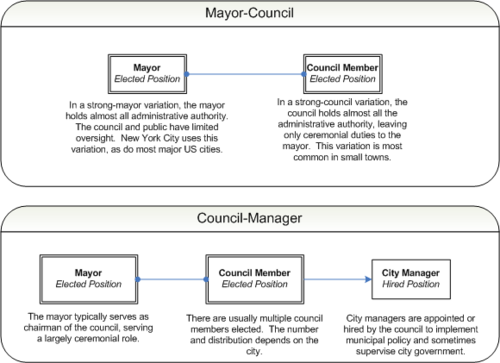- City manager
-
This article is about city managers in the United States. For county and city managers in the Republic of Ireland, see County Manager (Republic of Ireland).
A city manager is an official appointed as the administrative manager of a city, in a council-manager form of city government. Local officials serving in this position are sometimes referred to as the chief executive officer (CEO) or chief administrative officer (CAO) in some municipalities.[1] However, in a technical sense, the term "city manager," as opposed to CAO, implies more discretion and independent authority that is set forth in a charter or some other body of codified law, as opposed to duties being assigned on a varying basis by a single superior such as a mayor.[2]
Contents
History
Most sources trace the first city manager to Staunton, Virginia in 1908. Some of the other cities that were among the first to employ a manager were Sumter, South Carolina (1912) and Dayton, Ohio (1914). The city manager, operating under the council-manager government form, was created in part to remove city government from the power of the political parties, and place management of the city into the hands of an outside expert who was usually a business manager or engineer, with the hope that the city manager would remain neutral to city politics.[3]
By the end of the era[which?], around forty-five cities in the United States used a city manager form of government.[3]
Responsibilities
As the top appointed official in the city, the city manager is typically responsible for most if not all of the day-to-day administrative operations of the municipality, in addition to other expectations.[4][5]
Some of the basic roles, responsibilities, and powers of a city manager include:
- Supervision of day-to-day operations of all city departments and staff, directly and through department heads;
- Oversight of all hiring, firing, disciplining and suspensions;
- Preparation, monitoring, and execution of the city budget, which includes submitting each year to the council a proposed budget package with options and recommendations for its consideration and possible approval;
- Main technical advisor to the council on overall governmental operations;
- Public relations, such as meeting with citizens, citizen groups, businesses, and other stakeholders (the presence of a mayor may alter this function somewhat);
- Operating the city with a professional understanding of how all city functions operate together to their best effect;
- Attends all council meetings, but does not have any voting rights
- Additional duties that may be assigned by the council[4][5]
The responsibilities may vary depending upon charter provisions and other local or state laws, rules, and regulations. In addition, many states, such as the states of New Hampshire and Missouri, have codified in law the minimum functions a local "manager" must perform.[6]
Manager members of the ICMA are bound by a rather rigid and strongly enforced code of ethics that was originally established in 1924. Since that time the code had been up-dated/revised on seven occasions, the latest taking place in 1998. The updates have taken into account the evolving duties, responsibilities, and expectations of the profession; however the core dictate of the body of the code--“to integrity; public service; seek no favor; exemplary conduct in both personal and professional matters; respect the role and contributions of elected officials; exercise the independence to do what is right; political neutrality; serve the public equitably and governing body members equally; keep the community informed about local government matters; and support and lead our employ-ees”—have not changed since the first edition.[7]
Profile
In the early years of the profession, most managers came from the ranks of the engineering professions.[8] Today the typical and preferred background and education for the beginning municipal manager is a master's degree in Public Administration (MPA) and at least several years’ experience as a department head in local government or as an assistant city manager. As of 2005 more than 60% of those in the profession had a MPA, MBA, or other related higher-level degree.[9]
The average tenure of a manager is now 7–8 years and has risen gradually over the years. Tenures tend to be less in smaller communities and higher in larger ones, and they tend to vary as well depending on the region of the country.[9][10]
See also
Notes
- ^ City of Naperville
- ^ Svara, James H. and Kimberly L. Nelson. (2008, August). Taking Stock of the Council-Manager Form at 100. Public Management Magazine, pp 6-14, at: [1]
- ^ a b Brinkley, A: American History: A Survey, Twelfth Edition, page 579. New York: McGraw-Hill, 2007
- ^ a b Council Manager Form of Government, ICMA publication
- ^ a b Sample Ordinance, ICMA.
- ^ MRS NH RSA
- ^ ICMA Code of Ethics page
- ^ Stillman, Richard J. (1974). The Rise of the City Manager: A Public Professional in Local Government. Albuquerque: University of New Mexico Press.
- ^ a b ICMA statistics
- ^ Ammons, David M and Matthew J. Bosse. (2005). “Tenure of City Managers: Examining the Dual Meanings of ‘Average Tenure’.” State & Local Government Review, Vol. 37, No. 1, pp. 61-71. at: [2]
External links
- International City/County Management Association, ICMA is the professional and educational organization for chief appointed managers, administrators, and assistants in cities, towns, counties, and regional entities throughout the world. Since 1914, ICMA has provided technical and management assistance, training, and information resources to its members and the local government community. The management decisions made by ICMA's nearly 9,000 members affect more than 100 million individuals in thousands of communities—from small towns with populations of a few hundred to metropolitan areas serving several million.
- Staunton, Virginia: Birthplace Of City Manager Form Of Government, a history on the city manager system of government.
Categories:- Government occupations
- Management occupations
- Titles
- Local government in the United States
- Heads of local government
Wikimedia Foundation. 2010.

